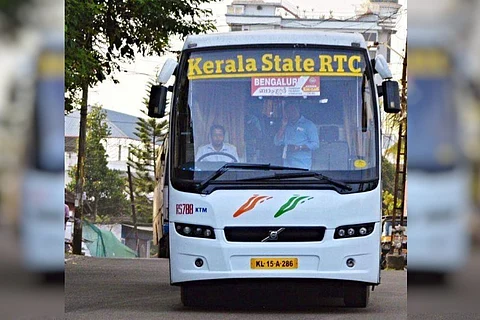

When the Interstate Bus Owners Association (IBOA) of Kerala called for a week-long strike of all private bus services in the state from June 24 to July 1, the Kerala Road Transport Corporation (Kerala RTC) was quick to change its policies so that long distance passengers do not get affected by the strike.
According to a Kerala RTC official, around 320 buses belonging to private operators ply from different parts of the state to cities such as Bengaluru, Chennai, Mysuru and Hyderabad each day, whereas only 50 buses of Kerala RTC travel to these cities each day. Now, when the IBOA called for a week-long strike to protest against high fines imposed by Motor Vehicles Department (MVD) on private interstate buses plying to and from Kerala, the strike was to affect the many passengers who depended on these buses.
But a study conducted by the Kerala RTC, which examined the ticket booking patterns of both the private bus services and the government-run Kerala RTC, found that the number of long-distance passengers that travelled in both these services each day remains more or less the same.
“From our study, we realised that out of the 2,000 or 2,500 seats in these 50 buses, only about 600 to 800 are booked as through tickets (tickets to the final destination). On long weekends, it used to go up to 1,000 to 1,500,” said the Kerala RTC official. He went on to add that the case was almost similar for the private bus services as most passengers were picked and dropped midway through the journey.
Change in reservation policies and increase in buses
In order to avoid inconvenience to long distance passengers due to the strike, the Kerala RTC decided to change its reservation policies in such a way that the booking of tickets for a bus service till midnight before the eve of the journey was reserved only for through passengers.
“Only the leftover tickets on the day of the journey were sold to passengers disembarking midway,” said the official.
As far as passengers travelling within the state were concerned, the official said that they already had non-luxury buses plying in every corner of the state and giving preferences to through passengers would not have affected other passengers travelling within the state.
The same reservation policy was also followed by the Tamil Nadu State Transport Corporation (TNSTC) and hence Kerala RTC decided to ensure that focus is provided more on buses plying to places like Bengaluru, Mysuru and Hyderabad. To make it easier for passengers, the Kerala RTC had also brought in extra buses for passengers travelling to different states from places such as Thiruvananthapuram and Ernakulam.
“What happened in the last one week is contrary to what the private bus operators thought. They thought that by cancelling services, people would suffer, prompting the State Government and the MVD to go easy on them. In reality, there was never an instance where the long distance passengers suffered due to lack of tickets,” claimed the Kerala RTC official.
He went on to state that the IBOA called off the strike on Monday, not because the government or the MVD decided to agree to their demands, but because the private operators started feeling the pinch after not functioning for a week.
“These private buses earn money by carrying luggage and by picking and dropping passengers in between the journey. This is illegal according to the MVD, which began to hold them responsible for their actions,” the official said.
Capitalising on the strike, the Kerala RTC managed to rake in an extra amount of almost Rs 9 lakh per day during the last one week, also earning an extra of over 45 lakh during the past one week when the interstate private buses went on a strike.
In April this year, the MVD had launched ‘Operation Night Riders’ following the incident on a Kallada Travels bus where two passengers were brutally beaten up by the bus staff. Through the operation, the MVD aim to keep a track on interstate private buses by monitoring whether buses are abiding by the rules. MVD has also been monitoring ticket booking agencies of the interstate buses. Round the clock squads were also formed by MVD for this in all the districts.